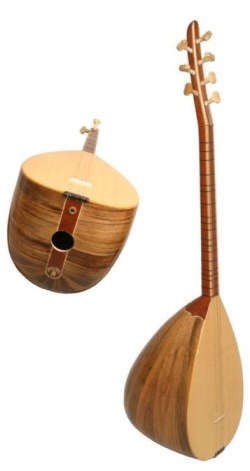NEWS RELEASE
LAKE SUPERIOR
STATE UNIVERSITY
*************************
Musicians to bring blend of Persian, Turkish melodies to LSSU
SAULT STE. MARIE, Mich. – A pair of Turkish and Persian musicians will bring the music of two cultures to Lake Superior State University in a one-night performance that is being well received throughout the country.
The program, featuring Kayhan Kalhor and Erdal Erzincan, will be the first of its kind on the LSSU campus.
The two will perform at 8 p.m. on Thursday, Oct. 26, in the LSSU Arts Center auditorium.
Tickets, $20 each and $10 for LSSU students, are available at the Norris Center box office and online at LSSU.edu.
Kalhor and Erzincan have been touring North America to promote a recording of their music with stops in New York, Chicago, Atlanta and Washington, D.C.
They'll stop in Sault Ste. Marie on their way to Toronto.
This concert brings together two virtuoso musicians steeped in the traditional music of their respective cultures – Persia (Iran) and Anatolia (Turkey).
The duets, which meld seamlessly, are performed on Persian kamancheh or spike fiddle and on the Turkish baglama, a lute sometimes known as the saz.
The classical music traditions of Persia and that of Ottoman Turkey have much in common.
They share the ancient modal compositional system known as maqam and improvisation plays a definitive role in performance.
Likewise, the regional folk musics of these two countries have much in common: the similarity of instruments such as the Kurdish and Persian tanbur and setar to the Turkish saz, the strumming techniques used for these instruments, and the high keening vocal techniques so common to mountainous lands and used by singers throughout this vast area.
If a single instrument were to represent Anatolian folk music, it would have to be the baglama [shown] - Erzincan's instrument.
There is no region, no village in Anatolia which is not familiar with it.
Considered a sacred instrument, the baglama is used in religious ceremonies of the Alevi, a mystical Sufi order that boasts 20 million followers in Turkey.
It is particularly associated with itinerant poets or troubadours known as asik.
The music performed by these two musicians, while derived from ancient roots, is thoroughly modern.
It is purely instrumental, which is a considerable deviation from tradition in both cultures, where the singer is considered pre-eminent.
While traditionally sung poetry is an integral aspect of virtually all Middle Eastern music, in this case it is the sound of the instruments that delivers the poetry.
This more abstract manner of conveying emotion and spirituality has always been present in Eastern music; instrumental music in India has long been at the service of vocal music and the most esteemed instrumental style in North India is that which approximates to the human voice.
In vocal music from the Arab world to Iran and India, accompanying instruments seek to imitate the nuances of the voice, often repeating melodic phrases or acting as bridges between stanzas.
The music of Erzincan and Kalhor is intensely spiritual and emotional; it is like a prayer.
It seeks to bring the listener into its trance-like realm by interweaving ecstatic rhythms with melodic phrases.
Kalhor, born in Tehran, Iran, began his musical studies at the age of seven under Master Ahmad Mohajer.
A child prodigy on the kamancheh, he was invited at age 13 to work in the Iranian National Radio and Television Orchestra, where he performed for five years.
At 17, Kalhor began working with the Shayda Ensemble of the Chavosh Cultural Center, the most prestigious arts organization at the time in Iran.
While performing with Shayda, he continued studying the Iranian classical repertoire (radif) with different masters.
He has composed works for Iran's most renowned vocalists, including Mohammad Reza Shajarian and Shahram Nazeri, and has performed and recorded with many of Iran's greatest artists.
In 1991, he co-founded Dastan, the renowned Persian classical music ensemble, and in 1997 he formed Ghazal ensemble with sitarist Shujaat Hussain Khan.
His recent commissions include works written for the Kronos Quartet and for Yo-Yo Ma’s Silk Road Project.
In 2003, he was nominated for two Grammy Awards.
Erzincan is an exceptional musician and disciple of Turkey’s great virtuoso of the baglama, Arif Sag.
A highly respected artist who started his own Baglama Music Academy in Istanbul, Erzincan has performed throughout the world.
His collaborations include concerts with Arif Sag and the Koln Philharmonic, and with the Ambassade Symphony Orchester Wien (an ensemble of the Vienna Symphony Orchestra).
He is a brilliant improviser, which makes him an ideal musical companion for Kalhor.
*************************
Join SooToday+
- Messages
- Post a Listing
- Your Listings
- Your Profile
- Your Subscriptions
- Your Likes
- Your Business
- Support Local News
- Payment History
SooToday+ members
Already a +member?
Not a +member?
Sign up for a SooToday+ account for instant access to upcoming contests, local offers, auctions and so much more.
